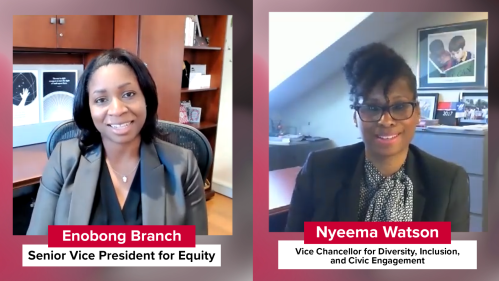Enobong (Anna) Branch and Nyeema C. Watson share their insights on this moment of racial reckoning and reflect on parallels to the past
Black History Month is nearing a close, but the effort to build a more inclusive community at Rutgers is just getting started.
This month Rutgers Today spoke with two women who are leading that charge: Enobong (Anna) Branch, senior vice president for equity at Rutgers University, and Nyeema C. Watson, vice chancellor of diversity, inclusion, and civic engagement at Rutgers University-Camden.
In a recent conversation on Zoom, our equity experts addressed issues that have come to the fore during this moment of racial reckoning, weighed in on the legacy of Dr. Martin Luther King Jr. and shared their insights on the best path forward to achieve social justice for all. Here is what they had to say.
What does Dr. King’s message mean in this moment?
Everyone remembers Dr. King’s dream, but some gloss over – or misconstrue – the rest of his message. Branch talks about the lessons she is still learning from Dr. King and the trouble with memorializing a sanitized version of his message.
Do you see a new leader ascending to take on a Dr. King-like mantle for today's movement?
The words of Dr. King are ubiquitous during Black History Month. In schools across America, he has become the face most associated with the civil rights movement of the 1960s. Branch talks about today’s social justice movements and whether she sees one leader becoming the next mantle.
Are today’s movements more inclusive than past civil rights movements?
Women were always integral to past civil rights movements, though not as celebrated s the men. Modern social justice movements feel much more inclusive, with women, participants of all colors and ethnicities and members of the LGBTQ community lifting their voices together. Watson discusses today’s women-led movements, #MeToo and Black Lives Matter among them, and the importance of their inclusivity.
Black women voters have been celebrated for "saving" our country election after election. How can we repay and uplift Black women voters?
This November, Georgia flipped blue for the first time during a presidential campaign since 1992. And the Southern state elected two Democrats – a Jewish man and a Black preacher – in two pivotal Senate runoff races. Stacey Abrams and Black women voters have been praised for turning out the vote in droves. Watson says Black women voters need policies that support them – not more praise.
How can white women be better allies? What are your action items for this community?
Black Lives Matter marches this summer drew millions of protesters, including many from the white community. But ending systemic racism requires more than marching. For white women who are committed to social justice, Watson and Branch offer these action items.



